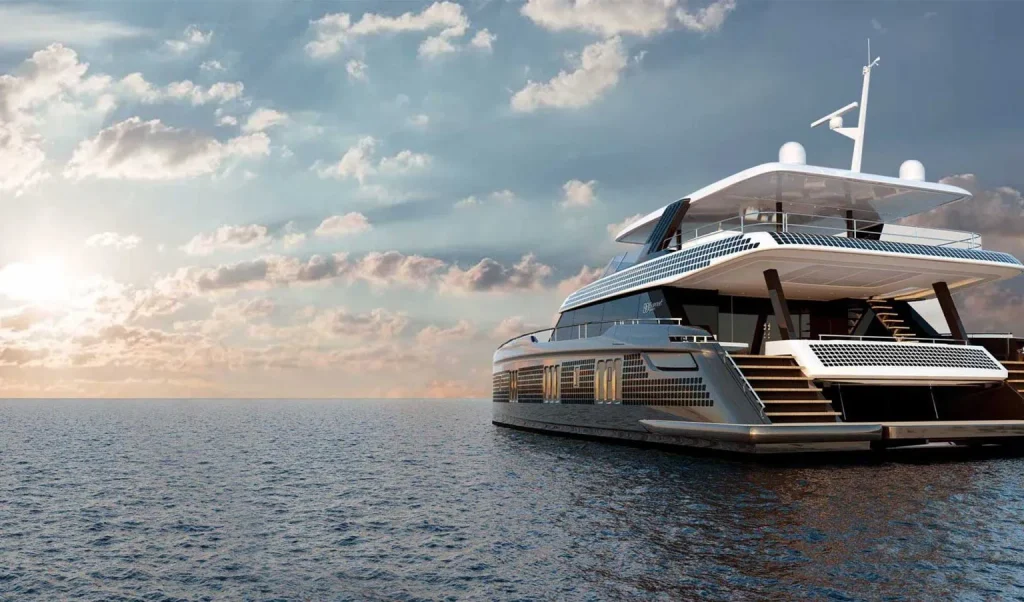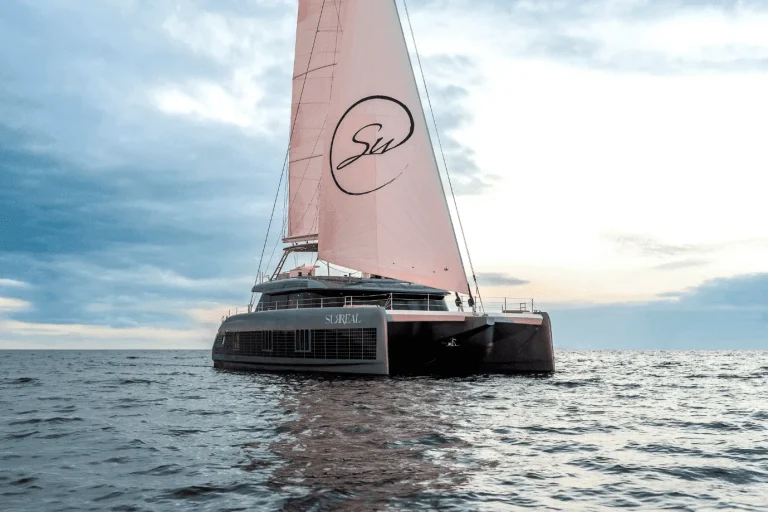Sunreef Yachts Eco has committed to launching over 40 models of its solar catamarans by the end of 2024 – including a wide selection of sailing yachts, power yachts and superyachts. Furthermore, the company has begun commissioning a range of hybrid eco-speeders, called Sunreef Ultima, to extend its solar catamaran line-up.
The 80 Sunreef Power incorporates 200m2 of solar panels (weighing about 360kg) that deliver 40kW peak per hour. Additionally, at reduced speeds, the Sunreef 80 Eco remains fully autonomous, running solely on solar power.
Each solar panel consists of photovoltaic cells, compromising a positive and negative layer for creating an electrical field. These are made of single-crystal silicon, a semiconductor that absorbs the radiations of the sun to produce electrical power via the photovoltaic effect.
Solar panels usually weigh 8-15kg per square meter, whereas Sunreef Yachts Eco’s solar cells are less than 1mm thick and weigh only 1.8kg per square meter. Each of the solar cells is ISO 9001:2015 certified and offers a peak performance of ±24%, which is reportedly 25-30% more power than conventional cells. Despite this, these solar cells do not heat up excessively when receiving sunlight.
Sunreef Yachts Eco has spread the ‘solar skin’ across the hulls, mast, superstructure, bow terrace and bimini roof of its vessels, so the solar panels receive enough sunlight at desired angles from early morning to late afternoon. At the same time, light rays bouncing off the surface of water to the solar panels also help generate electricity.

Sunreef Yachts Eco employs a photovoltaic integration technique in its solar catamarans to give the panels resistance to shock and abrasion. If the cell does eventually crack, the solid metal foundation remains intact to maintain a high power output. Furthermore, these solar panels reportedly experience no light-induced degradation, no temperature coefficient and favorable low-light and broad spectral response.
Likewise, the company asserts that the constraints of surface area for marine solar PVs have been addressed with the ability to manufacture customized solar panels. For instance, Sunreef Yachts Eco uses the lightest solar cells in the industry, which offer flexibility for placement on rounded surfaces of the solar catamaran.
The company also states that a solar-powered yacht has a significantly reduced carbon footprint compared with a standard diesel yacht. With solar power generation on catamarans, users can reportedly save 108.5kg of CO2 emissions per day or 39.6 metric tons annually. On average, Sunreef Yachts Eco’s solar catamarans generate up to 30kWh, promoting a positive green footprint.
To further reduce its carbon footprint, Sunreef Yachts Eco is researching how to redirect excess heat secured from direct sunlight on solar panels to the boilers of its solar catamarans. Furthermore, the company is developing an all-new 27.5m sustainable sailing superyacht, called The Zero Cat. In addition to sporting a solar power system, this catamaran will use a zero-emission generator to convert methanol to clean hydrogen for unlimited autonomy and greater self-sufficiency.
For more key marine renewables updates from the electric and hybrid marine technology industry, click here.



